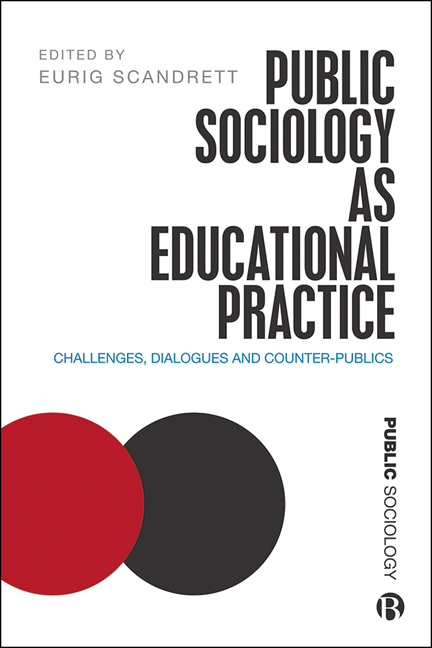I.6 - Dialogue I: Subaltern Counterpublics
Published online by Cambridge University Press: 02 March 2021
Summary
The dialogue around publics took the form of an invitation to the contributors to respond to a narrative around generative themes emerging from the cases in this section, and the extent to which the problematics posed in the provocation were responded to. Whilst all contributors were invited to participate, this dialogue took the form of an extended email correspondence between Paul Gilfillan, author of Case I.4, and Eurig Scandrett, editor and author of Case I.5, which is itself a response to an earlier version of Paul's case study. Whilst this inevitably puts a restriction on the diversity of voices in the section (not least because the only voices are those of the two male contributors), the correspondence between Paul and Eurig has provided the opportunity to examine, test and interrogate in some depth, the proposition of public sociology engagement with subaltern counterpublics.
In the provocation for this section, it is proposed that the publics with whom public sociologists should be engaging are best understood through Nancy Fraser's (1990) formulation of the subaltern counterpublic. The public sociologist therefore has a role in contributing to the analysis of subalternity in terms of understanding social axes of oppression, exploitation and injustice, and contributing to the strategies of countering these. The means of analysis and strategy development is through dialogue between the resources of sociology (and other academic disciplines) and the praxis of publics engaged in struggle, and this dialogue is a pedagogical task. This argument builds on Burawoy's ‘Between the organic public sociologist and a public is a dialogue, a process of mutual education’ (Burawoy, 2005: 7) and, more politically, Gramsci's ‘every relationship of “hegemony” is necessarily an educational relationship’ (Hoare and Smith, 1971: 350). How useful is this proposition?
The choice of cases from which to develop our dialogue have been drawn from selected forms of public sociology practice. In the newly emergent field of Mad Studies, the knowledge of madidentifying people who have experience of psychiatric diagnosis or mental distress is validated and valued through a dialogical education programme Mad People's History and Identity. The feminist movement has constructed an analysis of violence from the collective experience of women, and demonstrates the ongoing engagement with this analysis through dialogue between practice and theory in pedagogy and in participatory research.
- Type
- Chapter
- Information
- Public Sociology as Educational PracticeChallenges, Dialogues and Counter-Publics, pp. 93 - 108Publisher: Bristol University PressPrint publication year: 2020



